View in other NatureServe Network Field Guides
NatureServe
Montana
Utah
Wyoming
Idaho
Wisconsin
British Columbia
South Carolina
Yukon
California
New York
Showy Townsend-daisy - Townsendia florifer
Other Names:
Townsendia florifera
State Rank Reason (see State Rank above)
Known in Montana from only a few, small occurrences in the southwestern corner of the state.
- Details on Status Ranking and Review
Population Size
Score3 - Vey Small: Generally <2,000 individuals.
Range Extent
Score3 - Local Endemic or Very Small Montana Range: Generally restricted to an area <10,000 sq. miles (equivalent to the combined area of Phillips and Valley Counties) or <6 Sub-basins (4th code watersheds) Range-wide OR limited to one Sub-basin in Montana
Area of Occupancy
Score3 - Very Low: Generally occurring in 3 or fewer Subwatersheds (6th Code HUC’s).
Environmental Specificity
Score0-1 - Low to Moderate.
Trends
ScoreNA - Rank factor not assessed.
CommentTrends are unknown.
Threats
Score0-1 - Low to Medium.
Intrinsic Vulnerability
Score0-1 - Low to Moderate Vulnerability.
Raw Conservation Status Score
Score
9 to 12 total points scored out of a possible 16 (Rarity factors and threats only).
General Description
Showy Townsendia is an annual to short-lived perennial herb with 1 to several ascending stems that are 5-15 cm high and arising from a simple taproot. Leaves are spoon-shaped, 2-6 cm long at the base, and reduced upward. Foliage is sparsely to densely covered with short, appressed hairs. 1 to a few stalked flower heads are borne at the tips of the stems. Each head has 3-4 series of narrow, overlapping, green or purple involucral bracts that are 7-10 mm long, 13-34 pink ray flowers that are 7-12 mm long, and yellow disk corollas that are 3-6 mm long. The hairy achenes are topped by straight, stiff bristles that are 1-6 mm long in ray flowers and 3-8 mm long in disk flowers.
Phenology
Flowering in June.
Diagnostic Characteristics
Most of our species of Townsendia are low, nearly stemless plants. The only other species with stems greater than 5 cm long is T. parryi, which has blue to lavendar rays and involucral bracts that are 9-16 mm long.
Species Range
Montana Range
Range Descriptions
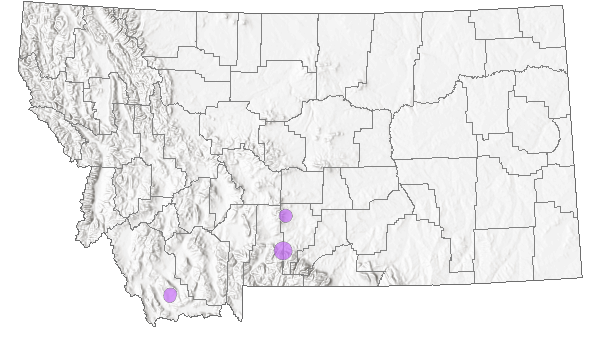
 Native
Native
Range Comments
WA to MT to NV, UT and WY. Known from Beaverhead County (Lesica et al. 2012. Manual of Montana Vascular Plants. BRIT Press. Fort Worth, TX).
Observations in Montana Natural Heritage Program Database
Number of Observations: 5
(Click on the following maps and charts to see full sized version)
Map Help and Descriptions
Relative Density
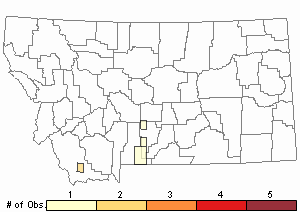
Recency
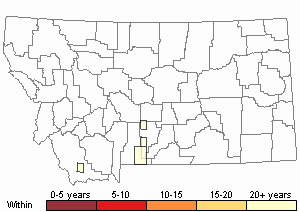
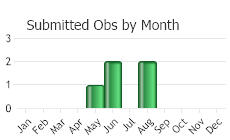
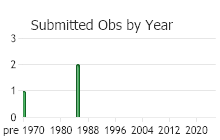
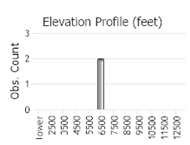 (Observations spanning multiple months or years are excluded from time charts)
(Observations spanning multiple months or years are excluded from time charts)
Habitat
Open soil on flats and eroding slopes of grassland and sagebrush steppe in the foothill zone.
Stewardship Responsibility
Threats or Limiting Factors
STATE THREAT SCORE REASON
Threat impact not assigned because threats are not known (MTNHP Threat Assessment 2021).
References
- Literature Cited AboveLegend:
 View Online Publication
View Online Publication Lesica, P., M.T. Lavin, and P.F. Stickney. 2012. Manual of Montana Vascular Plants. Fort Worth, TX: BRIT Press. viii + 771 p.
Lesica, P., M.T. Lavin, and P.F. Stickney. 2012. Manual of Montana Vascular Plants. Fort Worth, TX: BRIT Press. viii + 771 p. MTNHP Threat Assessment. 2021. State Threat Score Assignment and Assessment of Reported Threats from 2006 to 2021 for State-listed Vascular Plants. Botany Program, Montana Natural Heritage Program, Helena, Montana.
MTNHP Threat Assessment. 2021. State Threat Score Assignment and Assessment of Reported Threats from 2006 to 2021 for State-listed Vascular Plants. Botany Program, Montana Natural Heritage Program, Helena, Montana.
- Additional ReferencesLegend:
 View Online Publication
View Online Publication
Do you know of a citation we're missing? Beaman, J.H. 1957. The Systematics and Evolution of Townsendia (Compositae). Contributions From the Gray Herbarium CLXXXIII: 1-151.
Beaman, J.H. 1957. The Systematics and Evolution of Townsendia (Compositae). Contributions From the Gray Herbarium CLXXXIII: 1-151. Lesica, P. and J. Vanderhorst. 1995. Sensitive plant survey of the Sage Creek area, Beaverhead County, Montana, Dillon Resource Area, Bureau of Land Management. Unpublished report to the Bureau of Land Management. Montana Natural Heritage Program. 36 pp. plus appendices.
Lesica, P. and J. Vanderhorst. 1995. Sensitive plant survey of the Sage Creek area, Beaverhead County, Montana, Dillon Resource Area, Bureau of Land Management. Unpublished report to the Bureau of Land Management. Montana Natural Heritage Program. 36 pp. plus appendices. Lesica, P., K. Lackschewitz, J. Pierce, S. Gregory and M. O'Brien. 1986. Noteworthy collections: Montana. Madrono 33:310-312.
Lesica, P., K. Lackschewitz, J. Pierce, S. Gregory and M. O'Brien. 1986. Noteworthy collections: Montana. Madrono 33:310-312. Lesica, P., M.T. Lavin, and P.F. Stickney. 2022. Manual of Montana Vascular Plants, Second Edition. Fort Worth, TX: BRIT Press. viii + 779 p.
Lesica, P., M.T. Lavin, and P.F. Stickney. 2022. Manual of Montana Vascular Plants, Second Edition. Fort Worth, TX: BRIT Press. viii + 779 p. Quire, R.L. 2013. The sagebrush steppe of Montana and southeastern Idaho shows evidence of high native plant diversity, stability, and resistance to the detrimental effects of nonnative plant species. M.Sc. Thesis. Bozeman, MT: Montana State University. 124 p.
Quire, R.L. 2013. The sagebrush steppe of Montana and southeastern Idaho shows evidence of high native plant diversity, stability, and resistance to the detrimental effects of nonnative plant species. M.Sc. Thesis. Bozeman, MT: Montana State University. 124 p. Vanderhorst, J., B.L. Heidel, J. Pierce, and S.V. Cooper. 1997. Botanical survey of the Ruby Range, Madison County, Montana. Unpublished report to the Bureau of Land Management Dillon Resource Area. Montana Natural Heritage Program, Helena, MT. 47. pp. plus appendices.
Vanderhorst, J., B.L. Heidel, J. Pierce, and S.V. Cooper. 1997. Botanical survey of the Ruby Range, Madison County, Montana. Unpublished report to the Bureau of Land Management Dillon Resource Area. Montana Natural Heritage Program, Helena, MT. 47. pp. plus appendices.
- Web Search Engines for Articles on "Showy Townsend-daisy"





